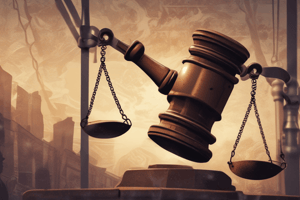Podcast
Questions and Answers
What must the state prove to convict a person of obstructing the course of justice?
What must the state prove to convict a person of obstructing the course of justice?
- That justice was merely obstructed or subverted (correct)
- That there was an intention to commit a crime
- That justice has been defeated
- That the conduct was inadvertent
In which circumstance can perjury not be committed?
In which circumstance can perjury not be committed?
- While affirming before a judicial officer
- In an affidavit during civil proceedings
- Within a police statement under oath (correct)
- During sworn court testimony
What distinguishes defeating the course of justice from obstructing it?
What distinguishes defeating the course of justice from obstructing it?
- The outcome of the conduct (correct)
- The intention behind the act
- The duration of the conduct
- The location of the conduct
Which form of intention is sufficient for contempt of court cases?
Which form of intention is sufficient for contempt of court cases?
Murder can be committed through which of the following means?
Murder can be committed through which of the following means?
Which of the following statements about judicial proceedings is true?
Which of the following statements about judicial proceedings is true?
What proves that a person has committed murder?
What proves that a person has committed murder?
What is the significance of the term 'dolus eventualis' in murder cases?
What is the significance of the term 'dolus eventualis' in murder cases?
Under what condition can an omission be punishable?
Under what condition can an omission be punishable?
Which of the following cases exemplifies a breach of contractual duty leading to criminal liability?
Which of the following cases exemplifies a breach of contractual duty leading to criminal liability?
In which situation does a duty arise due to the control of a dangerous object?
In which situation does a duty arise due to the control of a dangerous object?
Which of the following is an example of a protective relationship that establishes a duty to act?
Which of the following is an example of a protective relationship that establishes a duty to act?
What establishes a duty for an individual due to their professional position?
What establishes a duty for an individual due to their professional position?
How can a previous positive act lead to a legal duty to act?
How can a previous positive act lead to a legal duty to act?
Which law establishes the duty for taxpayers to file their taxes timely?
Which law establishes the duty for taxpayers to file their taxes timely?
What is the nature of an omission in legal terms?
What is the nature of an omission in legal terms?
What is the basis for a conviction of theft in relation to the possession of stolen property?
What is the basis for a conviction of theft in relation to the possession of stolen property?
Under which condition can multiple persons be convicted of theft regarding the same property?
Under which condition can multiple persons be convicted of theft regarding the same property?
What does S36 of the General Law Amendment Act primarily address?
What does S36 of the General Law Amendment Act primarily address?
Which criterion must be met for a person to be charged under S36 of the General Law Amendment Act?
Which criterion must be met for a person to be charged under S36 of the General Law Amendment Act?
Why may a person who steals from a thief still be prosecuted for theft?
Why may a person who steals from a thief still be prosecuted for theft?
Which statement best describes theft in the context of jurisdiction?
Which statement best describes theft in the context of jurisdiction?
What must an accused person demonstrate to avoid a conviction under S36 when found with suspicious goods?
What must an accused person demonstrate to avoid a conviction under S36 when found with suspicious goods?
What does the principle of de facto possession illustrate in theft cases?
What does the principle of de facto possession illustrate in theft cases?
What distinguishes a semi-automatic firearm from an automatic firearm?
What distinguishes a semi-automatic firearm from an automatic firearm?
Which category of firearms can a private individual legally possess without a license?
Which category of firearms can a private individual legally possess without a license?
What does section 4 of the Act specifically address regarding firearms?
What does section 4 of the Act specifically address regarding firearms?
In terms of licensing, what type of firearm falls under section 3 of the Act?
In terms of licensing, what type of firearm falls under section 3 of the Act?
What is a key characteristic of automatic firearms as mentioned in the content?
What is a key characteristic of automatic firearms as mentioned in the content?
Which statement correctly represents a 'normal' firearm in relation to the outlined sections?
Which statement correctly represents a 'normal' firearm in relation to the outlined sections?
What is required by a shooter to discharge a shot from a semi-automatic firearm?
What is required by a shooter to discharge a shot from a semi-automatic firearm?
How does the possession of a firearm without a serial number usually categorize the firearm?
How does the possession of a firearm without a serial number usually categorize the firearm?
What is necessary for an act to be considered lawful in terms of self-defense?
What is necessary for an act to be considered lawful in terms of self-defense?
Which of the following statements accurately describes unlawfulness?
Which of the following statements accurately describes unlawfulness?
In the case Papu 2015, why was the conduct of the accused not regarded as unlawful?
In the case Papu 2015, why was the conduct of the accused not regarded as unlawful?
What can be concluded about the necessity of defensive action in self-defense scenarios?
What can be concluded about the necessity of defensive action in self-defense scenarios?
Which of the following statements regarding private defense is false?
Which of the following statements regarding private defense is false?
In the case Teixeira, what did the court find regarding the appellant's reaction to the threat?
In the case Teixeira, what did the court find regarding the appellant's reaction to the threat?
What must an individual consider to lawfully use force in defense of property?
What must an individual consider to lawfully use force in defense of property?
What key aspect defines an act as unlawful under the discussed framework?
What key aspect defines an act as unlawful under the discussed framework?
Study Notes
Omission
- An omission is a failure to act, and is only criminal if there is a legal duty to act positively.
- These duties arise from:
- Contract - Failure to fulfill contractual obligations can be criminal.
- Act or Statute - Laws may impose a duty to act, such as filing taxes on time.
- Dangerous Object - A duty to control a dangerous object to prevent harm.
- Protective Relationship - Parents and guardians have a duty to care for children.
- Office - Certain individuals like police officers or medical practitioners have duties based on their roles.
- Previous Positive Act - Creating a situation that requires action can lead to a duty to act.
Unlawfulness
- Unlawfulness is unjustified conduct, and is a key element in criminal liability.
- Grounds of justification may excuse conduct that otherwise meets the definition of a crime.
Defences Exluding Unlawfulness
- Private Defence - A lawful use of force to defend oneself or another from an unlawful attack.
- The attack must be unlawful, against interests that should be protected (life, bodily integrity, property), and the defensive action should be necessary, directed at the attacker, and no more harmful than necessary.
- Necessity - An act is justified by necessity if it is the only way to prevent a greater harm.
- Consent - Consent to an act may justify it, but only if the consent is freely and voluntarily given and the person consenting is capable of understanding the nature of the act.
- Official Capacity - Conduct by law enforcement officers is sometimes justified by their official duties.
Contempt of Court
- Contempt of Court - Conduct that undermines the authority of the court.
- Contempt can be:
- In facie curiae (in the face of the court): Disrespectful behavior or interference with court proceedings taking place.
- Ex facie curiae (outside the court): Interference with the administration of justice outside of the physical courtroom.
- Dolus eventualis (intent) is sufficient for conviction of contempt of court.
- Contempt can be:
Defeating or Obstructing the Course of Justice
- Defeating the Course of Justice - Making it impossible for justice to be administered.
- Requires proof that justice was actually defeated.
- Obstructing the Course of Justice - Interfering with or hindering the administration of justice.
- Requires proof of interference or hindering.
Perjury
- Perjury - Making a false statement under oath in a judicial setting.
- May be verbal or in the form of an affidavit.
- Only applies to statements made during judicial proceedings.
Murder
- Murder - The unlawful and intentional causing of the death of another human being.
- May be caused by an act or an omission.
- Intention can be direct (dolus directus) or indirect (dolus eventualis).
Theft
- Theft - The unlawful and intentional taking of property belonging to another person.
- The taking must be without the owner's consent.
- Assumption of control by the thief is sufficient for theft, even if the owner has not lost control of the property.
- Theft is a continuing crime - A person can be prosecuted in the area where they are found with the stolen property, even if the theft took place in another area.
- Multiple individuals can be convicted of theft of the same property, even if they possessed it at different times, provided they each knew the property was stolen.
S36 of the General Law Amendment Act 62/1955
- S36 of the General Law Amendment Act - A statutory offense related to property theft.
- Elements of the Offense -
- Possession of goods for which there is a reasonable suspicion of theft
- Failure to give a satisfactory account for possession of the goods
- Accused must be found with the goods in possession at the time of questioning
- The test for reasonable suspicion uses the standard of a reasonable person.
Firearms
- Firearms - The Act (unspecified) deals with the unlawful possession of firearms.
- Semi-automatic firearms - Fire one shot per trigger pull.
- Automatic firearms - Fire continuously when the trigger is held down.
- Firearms without serial numbers - Prohibited under the Act.
- Section 3 of Act - Prohibits possession of "normal" firearms (semi-automatic or non-automatic) with serial numbers without a license.
- Section 4 of Act - Prohibits possession of firearms without serial numbers, including all automatic firearms, and therefore, automatic firearms cannot be licensed.
- Contravention of Section 4 - Always applicable for unlawful possession of an automatic firearm.
- Contravention of Section 3 - Applies to unlawful possession of a firearm with a serial number that could be licensed if the possessor had a license, but the possessor does not have a license.
Studying That Suits You
Use AI to generate personalized quizzes and flashcards to suit your learning preferences.
Related Documents
Description
This quiz covers important concepts in criminal law, focusing on omission and unlawfulness. It outlines the legal duties to act and explores various defenses that may exclude unlawfulness in criminal liability. Test your understanding of these fundamental principles!




